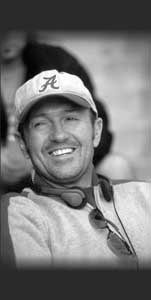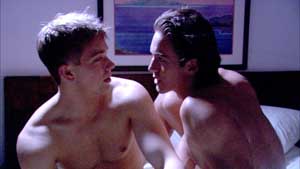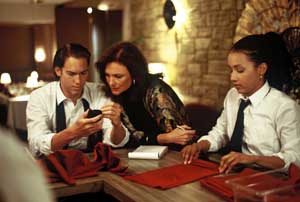-
- Cheney on gay relationships: ‘Freedom means freedom for everyone’
- Governor takes no stand on amendment banning same-sex marriage
- Judge strikes down portions of Louisiana sodomy law
- Marriage licenses back in Benton County, but only for opposite-sex couples
- Judge gives Virginia jurisdiction in lesbian custody case
- Judge to rule on legality of California domestic partners law
- Dancehall star Beenie Man barred from MTV show after protest
- National News Briefs
- World News Briefs
Arts & Entertainment
Latter Days saint
An interview with writer/director C. Jay Cox
Published Thursday, 02-Sep-2004 in issue 871
Sexy and promiscuous Christian (Wesley A. Ramsey) has his world turned upside down when Mormon missionary Aaron (Steve Sandvoss) moves into his building in Latter Days. When he isn’t waiting tables at Lila’s, the restaurant owned by Lila (Jacqueline Bisset), he’s adding notches to his headboard or hanging out with best friend, singer and fellow waiter Julie (Rebekah Johnson). But his curiosity gets the best of him and after striking up a friendship with Aaron, Christian makes a bet that he can get Aaron into bed.
The challenge is easier than Christian expects because Aaron is questioning his sexuality. When the other missionaries with whom he shares a flat, including the homophobic Ryder (Joseph Gordon-Leavitt) find Aaron kissing Christian, he is sent back home, where his father, a big-wig in the church practically disowns him. Even Aaron’s mother Gladys (the always amazing Mary Kay Place) doesn’t know how to deal with him, leading to a suicide attempt. There is a happy ending, however, which I won’t reveal, that did give Latter Days something of a radiant glow.
I had the pleasure of speaking with Latter Days writer and director C. Jay Cox, perhaps best known for writing the screenplay for the Reese Witherspoon comedy Sweet Home Alabama, about this project, his directorial debut. Latter Days is released on DVD Sept. 7.
Gay and Lesbian Times: Has Latter Days played at any LGBT film fests?
C. Jay Cox: We opened the Philadelphia film festival during the first part of July. Since then, the movie has been screened at six other festivals.
GLT: Do you make a point of going to all of the film festivals?
CJC: Yeah, so far I’ve been able to go to all of them. That’s been so cool. I love the idea that now I get to go around the country and see the movie and talk about it with people that actually want to talk about it.
GLT: I understand that the Mormon Church has expressed concern about Latter Days and is keeping a watchful eye on it. Can you comment on that?
CJC: I don’t know of anything official that’s been presented from the Church, but my brother is taking a writing class from somebody who works for the P.R. department for the Church. My brother mentioned Latter Days and the guy said, “Oh yes, we’re very aware of it.”
GLT: How does that make you feel?
CJC: It’s interesting. My sister-in-law said that her mother had somebody knock on her door and ask her to sign a petition to have the film banned. The film originally showed up on a website about Mormon filmmakers, films by and about Mormons. Originally, Latter Days appeared prominently and as they found out more about it, it dropped to the bottom of the list. I didn’t write or make the movie to start controversy. I’m not the one who drew the line in the sand. For a church that is so adamant that family comes first and foremost…unless you’re gay, then you get booted out of the church and the family. All I’m doing is shining a light on something that’s been happening for a long time.
GLT: Steve Sandvoss, the actor who plays the gay Mormon missionary Aaron, makes his movie debut in Latter Days. Why did you choose to have an unknown actor play this part?
CJC: We’d been looking for that character for a long time. It wasn’t a matter of experience. Our casting directors, when they said “19 year old Mormon boy,” we were seeing a lot of waifs (at the auditions). I pointed out that a lot of these guys are big strapping farm boys. When Steve walked in, I think [Producer Kirkland Tibbels] leaned over and said, “If this guy can read at all, we’re on the right track.” Then Steve gave an audition that just blew us away. Immediately we knew this was the guy.
GLT: The scenes between Aaron and Christian (Wesley Ramsey) are highly sexually charged. Do they play out on screen the way that you envisioned them when you wrote them?
CJC: Yeah. In fact there are so many scenes in the movie that are just so gratifying to me. When they were working on the scene I started to think, “Whoa, that’s what I had in mind. In fact, that’s what I had in mind, and then some.” When we started doing interiors and about three days into the shoot, we shot the first really intense scene. It was the scene in the bedroom after Christian’s cut himself. After we shot it my director of photography said, “If what happened in the room shows up on film, then you’ve got a scene there.”
GLT: Mary Kay Place, who was in Sweet Home Alabama, is also in Latter Days, playing Aaron’s devout and somewhat homophobic mother Gladys. Her performance is amazing. What was it like to work with her?
CJC: Mary Kay was so great. She took such a liking to Steve. She had invited us to her house to talk about the film. So we didn’t rehearse, per se, we talked about blocking. When they got on the set, they already had this great chemistry. I’ve got to tell you though, after meeting Steve’s mom, she and Mary Kay could be sisters. They were so much alike, and Mary Kay is just the sweetest most wonderful woman. She had done a lot of research and found websites of these Mormon parents with gay kids and a lot of heartbreaking stories. She was so behind the project. The sad thing was after Steve’s mom saw the movie, she liked the movie but said, “If I ever catch that Mary Kay in a dark alley…” (laughs). She was like, “What are you doing to my kid?” Which I think is a real testament to Mary Kay’s performance.
GLT: It was like the Tovah Feldshuh role in Kissing Jessica Stein. That woman was robbed of an Oscar. Mary Kay gave a Best Supporting Actress performance. I got goose bumps.
CJC: Wow! Yeah, she was a just a joy to work with.
GLT: Jacqueline Bisset plays Lila, the owner of the restaurant where Christian works. How did she come to be cast as Lila?
CJC: We put together a list with our casting directors of our fantasy cast. We would say, “Can you imagine Jacqueline Bisset as Lila?” Automatically, she was at the top of our fantasy list. We went out and met with her. We re-worked the part at her suggestion; she had some great ideas for the role. Then a few weeks later, she committed to being in it. It‘s funny because originally the role was written as Southern, but somewhere in between the third and fourth draft, Lila started to become British in my head. I remember thinking that’s the wrong voice. She’s supposed to be Southern. Then that voice just never changed. I was on the phone with Jacqueline reading through the scenes, and all I could hear was her voice. It was chilling because it was exactly what Lila’s voice sounded like in my head.
GLT: The movie has kind of an old-fashioned, hard won happy ending. Do you believe in happy endings?
CJC: Oh yeah. Part of it was me being a sucker for a romance. If you want to talk old fashioned, what it really is – it’s my gay women’s picture (laughs); a homo chick flick.
GLT: Have you started work on your next film project?
CJC: I’ve got other projects lined up. It was such a fun experience shooting this independent, low budget movie. If I had my choice, I would turn around and do it all over again. I have an independent script we might do which is just a straight romantic comedy. We were always joking on the set. There were some days this project became a lot more personal and a lot more emotional for me. More than I had anticipated. There were days on the set that were just amazing experiences, but then there were days on the set that were so emotionally involved that we all just decided the next thing would be a comedy without emotional commitment. I’m also doing a rewrite of a project for New Line and then there’s a project they want me to direct.
GLT: Do you have any interest in expanding your writing to include stage plays or even book form?
CJC: Yes and no. Every time I go to New York, I’m amazed at the respect that is given to language on the stage. The idea that you can have an actor sitting on a chair, speaking for 10 minutes and the audience just soaks it up. Whereas on film they say you can’t do that, although we broke some of those rules with this movie. On the other hand, writing is the really difficult part and I don’t know if I have the attention span necessary to write a novel! I sit down to write a screenplay and I think there is no way I’m smart enough to fill up 100 pages of a really loose format. To write 800 pages in a novel; I don’t think I would do that if somebody had a gun to my head (laughs). I started out in theater. I always hoped that if the play were really good, someone would want to make it into a movie. Movies were always the goal. I realized I needed to cut out the middleman and concentrate on making movies.
|
|
Copyright © 2003-2025 Uptown Publications




